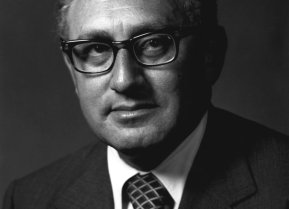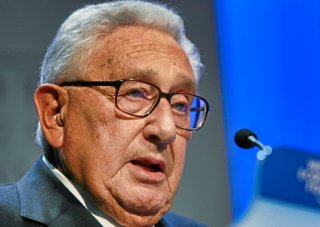Henry Kissinger Was a Legend for a Reason
As former New York Times editor Barry Gewen observed in his recent book, The Inevitability Of Tragedy: Henry Kissinger And His World, “The lessons he has been trying to impart may not be to the liking of most people, but they are more important than ever before.”
Henry Kissinger, who died yesterday, was the last representative of the Eastern Establishment that guided foreign policy after World War II, when America quickly rose to become the predominant world power.
For all the emphasis on Kissinger’s genuine admiration for Bismarck and Metternich, he also revered American statesmen and diplomats such as Dean Acheson and George F. Kennan, both of whom he wrote about at length in the New York Times. Indeed, when I met and interviewed Kissinger (who was honorary chairman of the Center for the National Interest which publishes this website) in his New York office in July 2015, he became emotional in talking about Kennan. Kennan, he said, had all the conceptual tools for shaping American foreign affairs but lacked the ability to translate them into action.
To a great extent, Kissinger himself sought to bridge that gap and perpetuate the traditions of the American foreign policy establishment. It was an unlikely accomplishment. His rapid ascent, from working nights in a shaving brush factory during high school to the summit of power in Washington, offers perhaps the most vivid example of the rise of Jews into the Protestant establishment after World War II. He attended Harvard, which had enforced quotas on Jews before World War II. He joined the Council on Foreign Relations whose members had often taken a frosty view of Jews and Israel. And he worked as an adviser to Nelson Rockefeller, the titular leader of the Eastern Establishment wing of the GOP.
And yet, even as he joined the establishment, Kissinger could sense that something was changing in America, at least on the right. Elitism was out. Populism was in. In his private diaries, he depicted the 1964 Republican convention at the Cow Palace in San Francisco as redolent of what he had witnessed as a youth in Nazi Germany: “the Goldwater victory is a new phenomenon in American politics—the triumph of the ideological party in the European sense. No one can predict how it will end because there is no precedent for it.”
As national security adviser and Secretary of State to Richard M. Nixon and Secretary of State to Gerald Ford, Kissinger became the bete noire of the right and left during and after Vietnam for pursuing an amoral realpolitik. The old order was collapsing. A new one was emerging that viewed an emphasis on national interests as inimical to wholesome American values. As Kissinger told me in 2015, “This new foreign-policy view was more missionary; it emphasized that America had a mission to bring about democracy—if necessary, by the use of force. And it had a kind of intolerance toward opposition. It then became characteristic of both the extreme Right and the extreme Left, and they changed sides occasionally.”
Kissinger was assailed on the Republican right for pursuing détente with the Soviet Union during the 1970s. At the 1976 Republican convention in Kansas City, for example, Ronald Reagan stated that “Henry Kissinger's recent stewardship of US foreign policy has coincided precisely with the loss of US military supremacy. . . . Under Kissinger and Ford this nation has become No. 2 in military power in a world where it is dangerous—if not fatal—to be second best.”
But the policy of détente that Nixon and Kissinger pursued ended up helping to erode Soviet power. Kissinger may have underestimated the power of human rights, but his basic impulse to limit the arms-race competition could not have been more sensible. His approach was complemented by West Germany’s push for warmer relations with the Warsaw Pact countries, which helped to allay the fear of German revanchism. Absent détente it seems unlikely that the Soviet Union would have collapsed peacefully from 1989-1991. It formed what Kissinger himself termed an “indispensable prelude” to the Reagan era.
Kissinger’s record, whether on Chile or China, will continue to stir controversy, probably even more in coming decades, as a new, and perhaps even less concessive, generation of historians confronts his legacy. But as America confronts a new era of uncertainty abroad, it could do worse than to ponder the lessons that he exemplified and propounded about the need for a stable equilibrium of power abroad, particularly when it comes to relations between America and China. When it came to Ukraine, Kissinger explained this past April that while he had previously opposed Kyiv’s membership in NATO, it would now form an indispensable part of any peace settlement. It is hard not to feel that an essential part of ballast in American foreign policy has disappeared with Kissinger’s death.
As former New York Times editor Barry Gewen observed in his recent book, The Inevitability Of Tragedy: Henry Kissinger And His World, “The lessons he has been trying to impart may not be to the liking of most people, but they are more important than ever before.”
About the Author
Jacob Heilbrunn is editor of The National Interest and is a nonresident senior fellow at the Atlantic Council’s Eurasia Center. He has written on both foreign and domestic issues for numerous publications, including The New York Times, The Washington Post, The Wall Street Journal, Financial Times, Foreign Affairs, Reuters, Washington Monthly, and The Weekly Standard. He has also written for German publications such as Cicero, Frankfurter Allgemeine Zeitung, and Der Tagesspiegel. In 2008, his book They Knew They Were Right: the Rise of the Neocons was published by Doubleday. It was named one of the one hundred notable books of the year by The New York Times. He is the author of America Last: The Right’s Century-Long Romance with Foreign Dictators, coming in 2024.
All images are Creative Commons.


